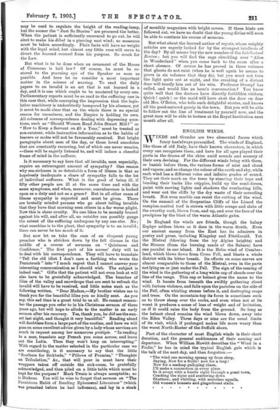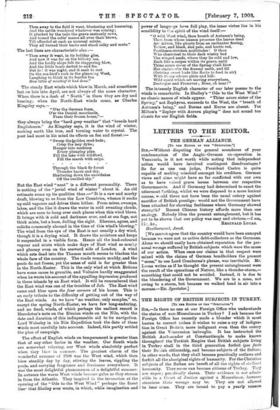ENGLISH WINDS.
WINDS and -thunder are two elemental forces which fancy ha.sialways personified. The winds of England, like those of old Italy, have their known characters, in which
every one recognises them, and have for all ages played their parts in the drama of the skies amid sounds and scenery of their own devising. For the different winds bring with them, or banish before them, the various forms of mist and cloud
and vapour, and so change the colour of the earth and sky, while each wind has a different voice and infinite grades of sound. They set their mark on the trees by shearing their tops and
bending their backs like cripples, build up the sand-dunes, paint with moving lights and shadows the everlasting hills, and wear out the cliffs by the dry waste of their corroding breath. Not even marble can resist the cutting of the wind.
On the summit of the Serpentine Cliffs of the Lizard the campion-matted turf is strewn with little scraps and slabs of the swarthy rock, blown from, and up, and over the face of the precipices by the blast of the warm Atlantic gales.
In England the winds are friends, though the balmy Zephyr seldom blows as it does in the warm South. Even our ancient enemy from the East has its admirers in poetry and prose, including Kingsley and FitzGerald. Yet the Mistral (blowing from the icy Alpine heights) and
the Sirocco (from the burning sands of the Sahara) have one parallel in our island. It is the Helm wind of Cumber- land, which blows down from Cross Fell, and blasts a whole district with its bitter breath. Its effects on some nerves are almost comparable to those of the Mistral, even in the parts not lying on or just under the Fell. The sign of the coming of the wind is the gathering of a long white cap of clouds over the line of the range. This cap or helmet gives the name to the wind. It bursts from beneath the swiftly gathering cloud with furious violence, and falls upon the parishes on the side of the Fell, often whirling stones before it, and destroying crops and trees. On the mountain-top its force is sometimes such as to throw sheep over the rocks, and even when not at its worst it produces a sense of loss of weight and of levitation, as if it could raise the body from the ground. So long as the helmet cloud remains the wind blows down, away into the Eden Valley. Three days or nine are the usual limits of its visit, which if prolonged makes life more weary than the worst North-Easter of the Suffolk shore.
Part of the character of most English winds is their short duration, and the general suddenness of their coming and departure. When William Howitt describes the "Wind in a Frolic," he has in mind the typical English gale which is the talk of the next day, and then forgotten :— "The wind one morning sprang up from sleep, Saying, Now for a frolio! now for a leap ! Now for a madcap galloping chase,
I'll make a commotion in every place. So it swept with a bustle right through a great town,
Cracking the signs and scattering down Shutters; and whirling, with merciless squalls, Old women's bonnets and gingerbread stalls.
Then away to the field it went, blustering and humming, And the cattle wondered whatever was coming; It plucked by the tails the grave matronly cows, And tossed the colts' manes all over their brows, Till offended at such an unusual salute, They all turned their backs and stood sulky and mute."
The last lines are characteristic also :—
"Then away it want, in its holiday glee,
And now it was far on the billowy sea, And the lordly ships felt its staggering blow, And the little boats darted to and fro.
But lo ! it was night, and it sank to rest On the sea-bird's rock in the gleaming West, Laughing to think in its fearful fun
How little of mischief it had done."
The steady East winds which blow in March, and sometimes last on late into April, are not always of the same character. When there is a dash of " North" in them they are dry and bracing; when the North-East winds come, as Charles Kingsley says,—
"O'er the German foam, O'er the Danish moorlands,
From their frozen home,"—
they always bring the "hard grey weather" that "breeds hard Englishmen." As Kingsley says, it is the wind of winter, making earth like iron, and turning water to crystal The poet had most in his mind its effects on fen and forest :— "Sweep the [golden reed-beds ; Crisp the lazy dyke; Hunger into madness Every plunging pike.
Fill the lake with wildfowl, Fill the marsh with snipe.
• ..... • Through the black fir forest Thunder harsh and dry, Shattering down the snowflakes Off the curdled sky."
But the East wind "neat" is a different personality. There is nothing of the "jovial wind of winter" about it. An old estimate sums up its qualities thus :—" It is a raw and murky draft, blowing to us from the Low Countries, whence it sucks up cold vapours and drives them hither. From mires, swamps, lakes, and the like it draws the water in cold sweating clouds, which are seen to hang over such places when this wind blows. It brings with it cold and darkness ever, and at sea fogs, not thick mists, but a haze, dulling the sight. Rheums, agues, and colicks commonly abound in the time of this wind's blowing." The wind from the eye of the East is not usually a dry wind, though it is a drying wind. It draws the moisture and keeps it suspended in a visible form. Hence all the lead-coloured vapour and mists which make days of East wind so murky and gloomy even on the seaward side of London. A wind which sets dead into the Thames mouth seems to blacken the whole face of the country. The roads remain muddy, and the pools do not freeze, yet the sense of cold is far greater than in the North-Easter. This is the only wind at which Britons have some cause to grumble, and Voltaire hardly exaggerated when he wrote his account of the appalling depression produced in these islands by an East wind. It will be remembered that the East wind was one of the troubles of Job. The East wind came and blew upon the four corners of his house. This is an early tribute to the difficulty of getting out of the way of the East winds. As we have "no weather, only samples," so, except the spring North-Easter, we have few long-enduring, and no fixed, winds, of which perhaps the earliest record is Herodotus's note on the Etesian winds on the Nile, with the date and duration of this indispensable aid to its navigation. Lord Wolseley in his Nile Expedition took the date of these winds most carefully into account. Indeed, this partly settled the plan of campaign.
The effect of English winds on temperament is greater than that of any other factor in the weather. Our South winds are somewhat relaxing, our West winds absolutely perfect when they blow in slimmer. The greatest charm of the wonderful summer of 1898 was the West wind, which then blew steadily day by day, stirring the leaves, rippling the pools, and carrying fragrance and freshness everywhere. It was the most delightful phenomenon of a delightful summer.
In autumn the warm West winds become gales as they stream in from the Atlantic. They inspired in the invocation at the opening of the "Ode to the West Wind" perhaps the finest line'- that Shelley ever wrote, in which, while imagination and power of language have full play, the inner virtue lies in his sensibility to ti.e spirit of the wind itself :--
"0 wild West wind, thou breath of Autumn's being, Thou from whose unseen presence the leaves dead Are driven, like ghosts from an enchanter fleeing, Yellow, and black, and pale, and hectic red, Pestilence-stricken multitudes ! 0 thou Who chariotest to their dark wintry bed The winged seeds, where they lie cold and low, Each like a corpse within its grave, until Thine azure sister of the Spring shall blow Her clarioe o'er the dreamy earth, and fill (Driving sweet buds like flocks to feed in air With living odours plain and hill:
Wild spirit which art moving everywhere, Destroyer and Preserver ; Hear, oh hear!"
The intensely English character of our later poems to the winds is remarkable. In Shelley's "Ode to the West Wind" no classic names of winds appear. "Thine azure sister of the Spring," not Zephyrus, succeeds to the West, the "breath of Autumn's being," and Boreas and Eurus are absent. Yet Milton's "Zephyr with Aurora playing" does not sound too classic for our English fields.











































 Previous page
Previous page